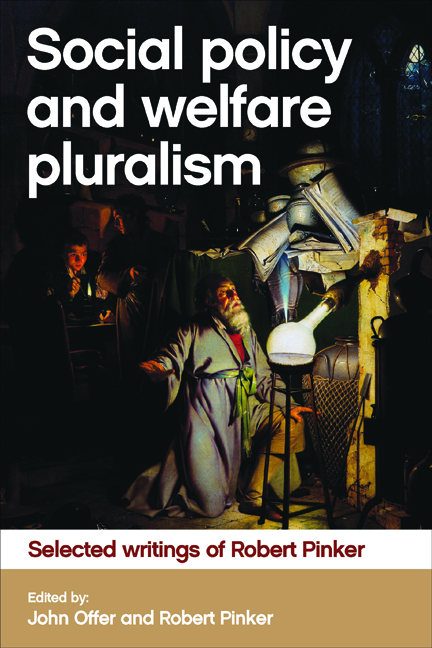Book contents
- Frontmatter
- Contents
- Acknowledgement
- Preface
- General introduction: Robert Pinker on rethinking approaches to welfare
- Introduction to Part One On social policy studies
- one The ends and means of social policy: a personal and generational perspective
- two Social theory and social policy: a challenging relationship
- three Stigma and social welfare
- four The welfare state: a comparative perspective
- five Richard Titmuss and the making of British social policy studies after the Second World War: a reappraisal
- Introduction to Part Two On social care, communities and the conditions for well-being
- six Report of the Working Party on the Role and Tasks of Social Workers: an alternative view
- seven The quest for community: from the Settlement Movement to the Griffiths Report: an historical perspective
- eight Citizenship, civil war and welfare: the making of modern Ireland
- Introduction to Part Three On welfare pluralism
- nine Golden Ages and welfare alchemists
- ten From gift relationships to quasi-markets: an odyssey along the policy paths of altruism and egoism
- eleven The experience of citizenship: a generational perspective
- twelve The right to welfare
- thirteen The prospects for social policy in the UK after the 2015 General Election
- Afterword On the post-Brexit prospects for social policy in the UK
- References
- Index
twelve - The right to welfare
Published online by Cambridge University Press: 08 April 2022
- Frontmatter
- Contents
- Acknowledgement
- Preface
- General introduction: Robert Pinker on rethinking approaches to welfare
- Introduction to Part One On social policy studies
- one The ends and means of social policy: a personal and generational perspective
- two Social theory and social policy: a challenging relationship
- three Stigma and social welfare
- four The welfare state: a comparative perspective
- five Richard Titmuss and the making of British social policy studies after the Second World War: a reappraisal
- Introduction to Part Two On social care, communities and the conditions for well-being
- six Report of the Working Party on the Role and Tasks of Social Workers: an alternative view
- seven The quest for community: from the Settlement Movement to the Griffiths Report: an historical perspective
- eight Citizenship, civil war and welfare: the making of modern Ireland
- Introduction to Part Three On welfare pluralism
- nine Golden Ages and welfare alchemists
- ten From gift relationships to quasi-markets: an odyssey along the policy paths of altruism and egoism
- eleven The experience of citizenship: a generational perspective
- twelve The right to welfare
- thirteen The prospects for social policy in the UK after the 2015 General Election
- Afterword On the post-Brexit prospects for social policy in the UK
- References
- Index
Summary
Introduction
Marshall's first collection of essays was published in 1950 under the title Citizenship and Social Class, and these essays were subsequently reprinted in a larger collection, Sociology at the Crossroads, which was published in 1963. In Britain at that time the dramatic growth of sociology as an academic discipline was only just beginning, and the subject of social policy and administration was still being taught mainly as an option within other social science degrees or in the context of post-graduate diplomas, usually as a prologue to social work training. Very few practising sociologists had read the subject for a first degree; Marshall himself did not become a member of a sociology department until he was in his late thirties. As an undergraduate he read history at Cambridge, and, after spending the First World War interned as a civilian prisoner in Germany, he was elected in 1919 to a fellowship at Trinity College, Cambridge. He was appointed to the London School of Economics in 1925 as a tutor in social work – a subject about which he says that he ‘knew nothing’. He claims that when he joined Morris Ginsberg's department in 1929 and began teaching comparative social institutions, he was ‘quite ignorant of sociology in the professional sense’, although he had developed during his internment ‘a sociological curiosity and had acquired, in my historical studies, some skills in the analysis of social systems and the interpretation of social change’.
In paying tribute to Marshall's contribution to the development of social policy and administration one must first honour his achievement as a sociologist. He became a sociologist when he was teaching at the London School of Economics, ‘very naturally, almost totally under the influence of Hobhouse, as interpreted by Ginsberg’. Marshall has referred to his ‘use of Hobhouse's threefold categorisation of kinship, authority and citizenship as the basic principles of social order’ and his study of the works of Max Weber, Emile Durkheim and Karl Mannheim, which formed the basis of his sociological education and can be discerned in his own work. These were the beginnings from which he went on to make his own distinctive and original contribution to the subject.
- Type
- Chapter
- Information
- Social Policy and Welfare PluralismSelected Writings of Robert Pinker, pp. 239 - 268Publisher: Bristol University PressPrint publication year: 2017



